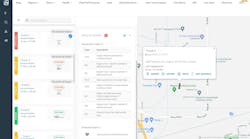Markup of the wetlines legislation will begin Thursday, November 5, according to officials on the House of Representatives Transportation and Infrastructure Committee. This is one of the last opportunities for the tank truck industry to promote changes to make the legislation more tolerable.
Cargo tank operators are being urged to make a last effort to call on members of Congress to stop what is essentially an ineffective and potentially dangerous piece of legislation. “Call, fax, or email your member of Congress,” said John Conley, president of National Tank Truck Carriers Inc (NTTC). “Remind them again of the potential economic impact on your business and the possible safety impact on your workers.”
A wetlines ban on all tank trailers that handle hazardous materials will be among the amendments considered for the Hazardous Materials Safe Transportation Act of 2009. Committee Chairman James Oberstar, D-MN, plans to shove the Hazmat Transportation legislation through Congress separately from the Highway Bill, which the Obama Administration has delayed until at least 2010.
As it stands now, the amendment would ban retained-product piping (wetlines) on tank trailers used to transport any type of hazardous material, but wetlines would still be perfectly legal on tank trucks (a factor that makes no sense if wetlines pose such a risk that immediate Congressional action is needed). In addition, the wetlines ban still would apply to both new and used tank trailers. Who knows how many tank repair shop workers will die as a result of this ill-conceived retrofit requirement.
Even the International Brotherhood of Teamsters joined NTTC, Truck Trailer Manufacturers Association, and other groups in opposing the Oberstar’s legislation. In a letter to Congress, The Teamsters questioned the high cost of a retrofit requirement, both in dollars and worker safety. The Teamsters’ letter suggested that advocates of the wetlines ban, such as the National Transportation Safety Board, have relied on faulty reports and inconsistent studies to support their position on this issue.








